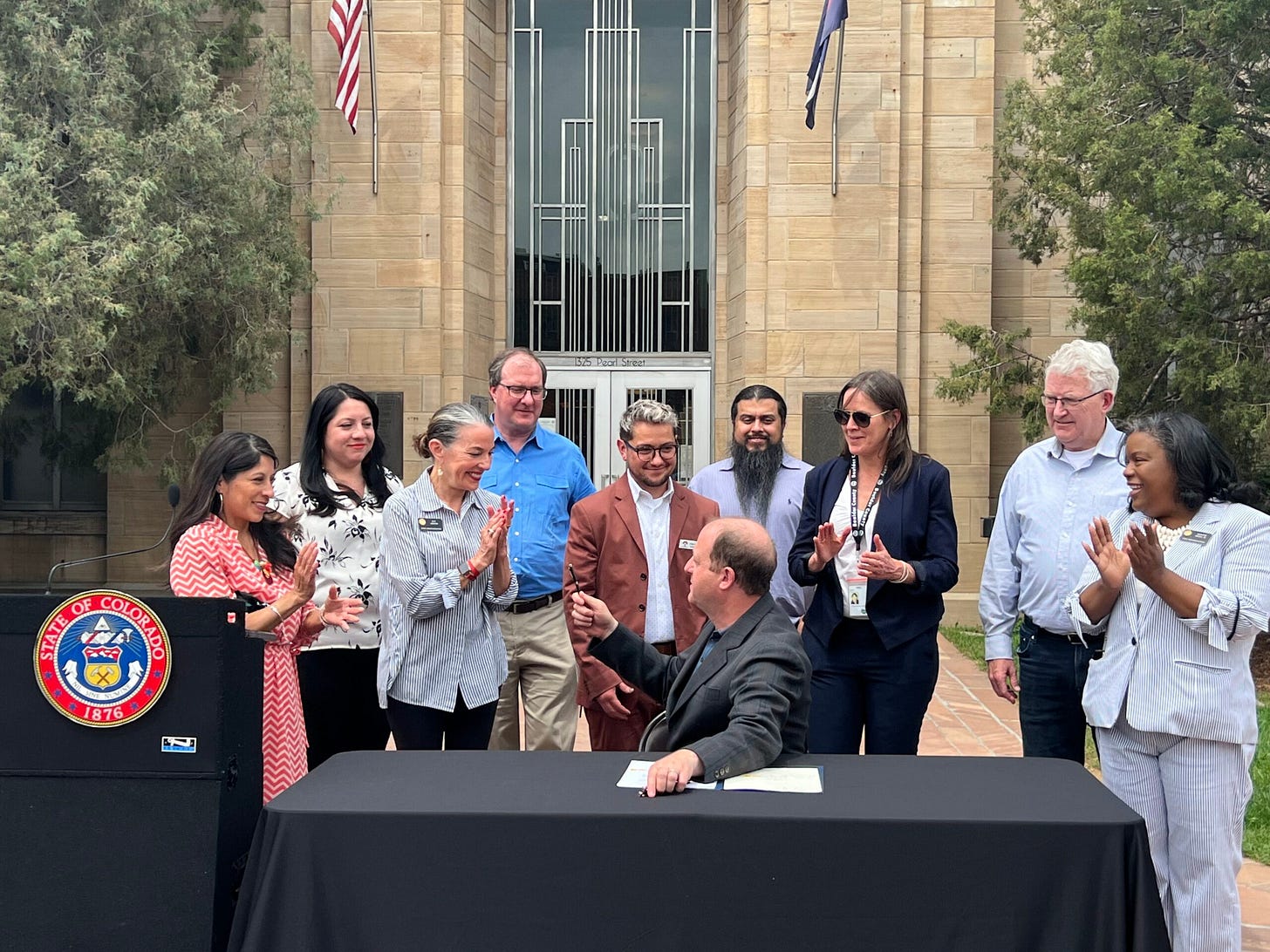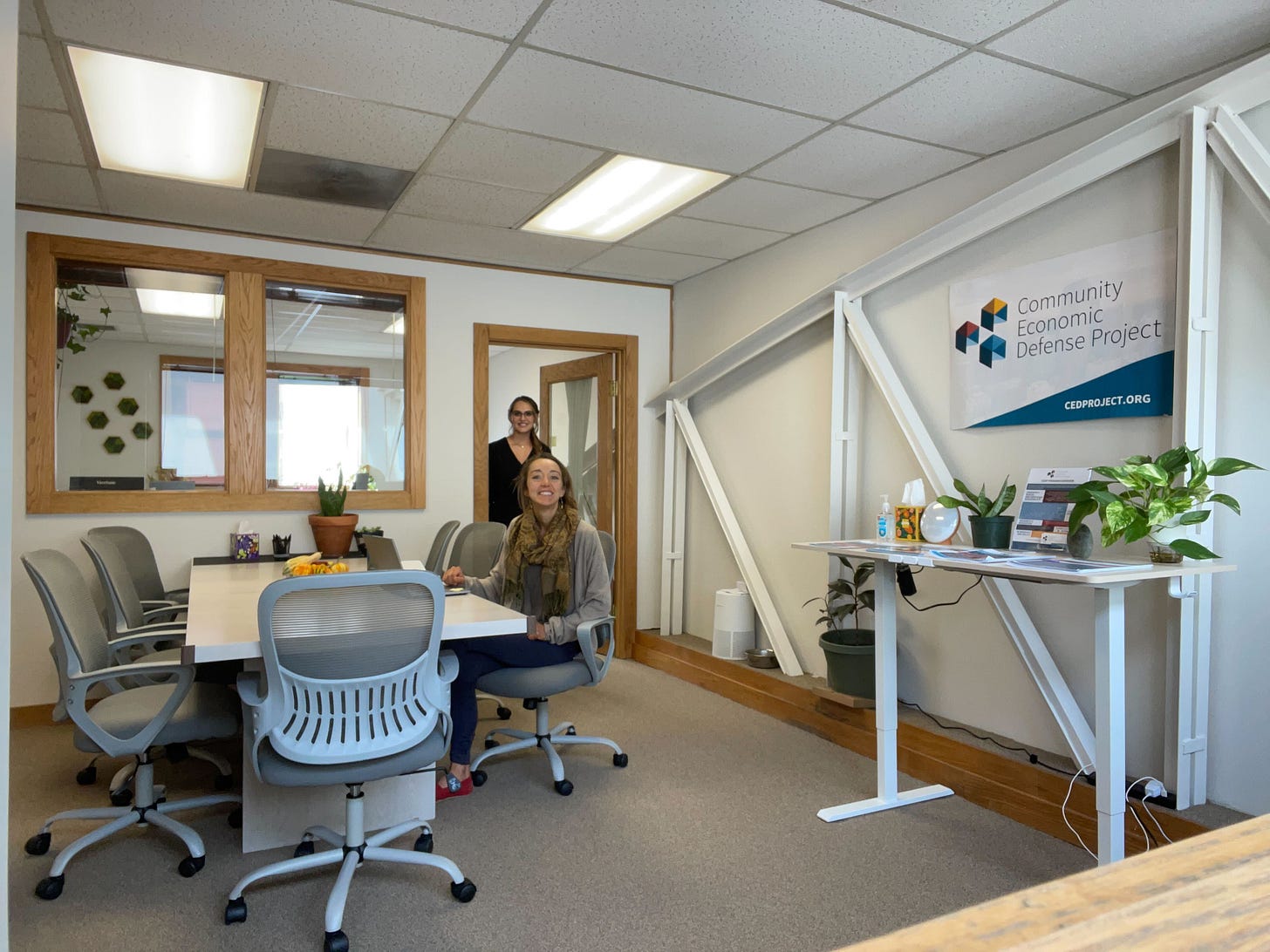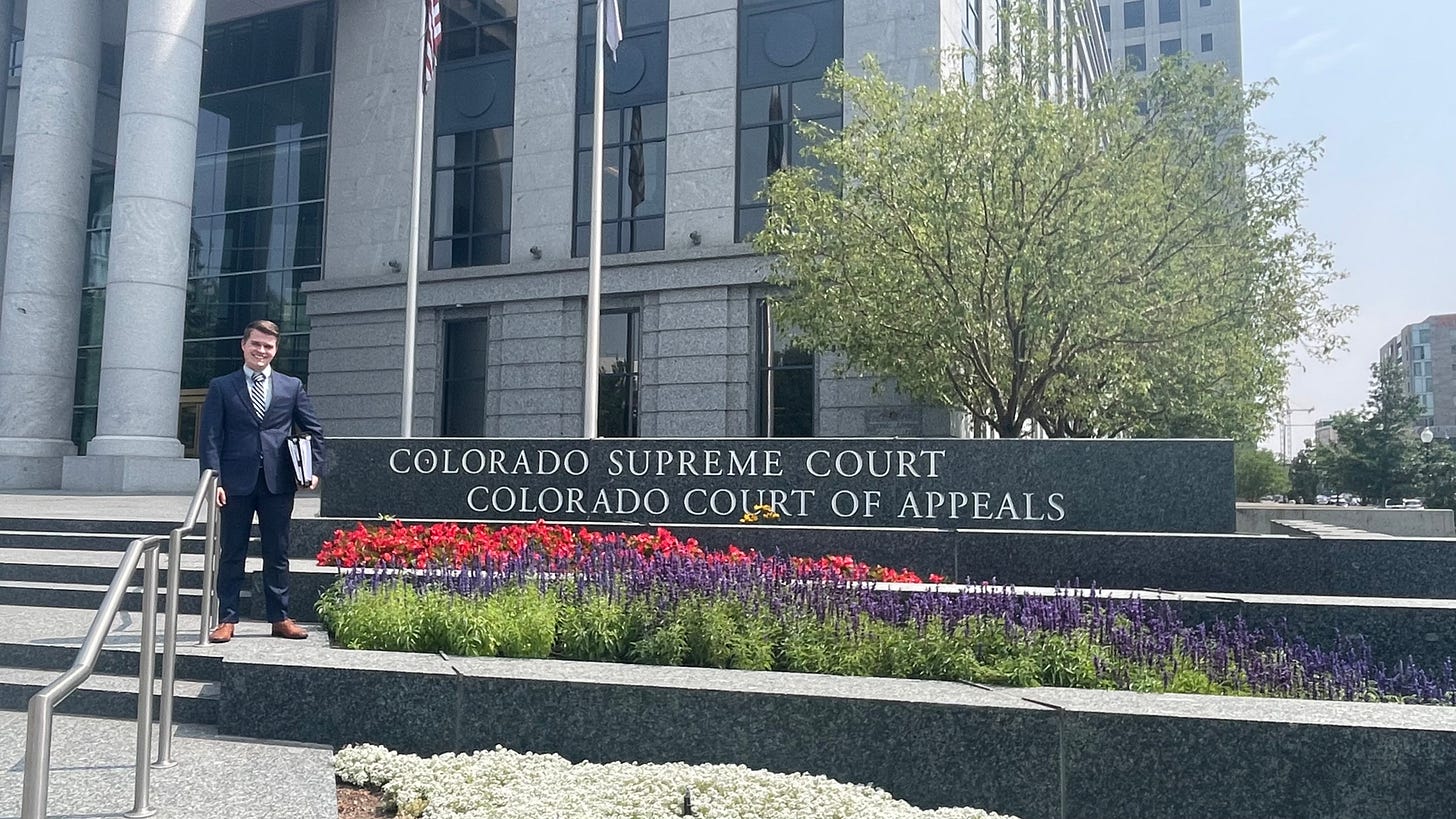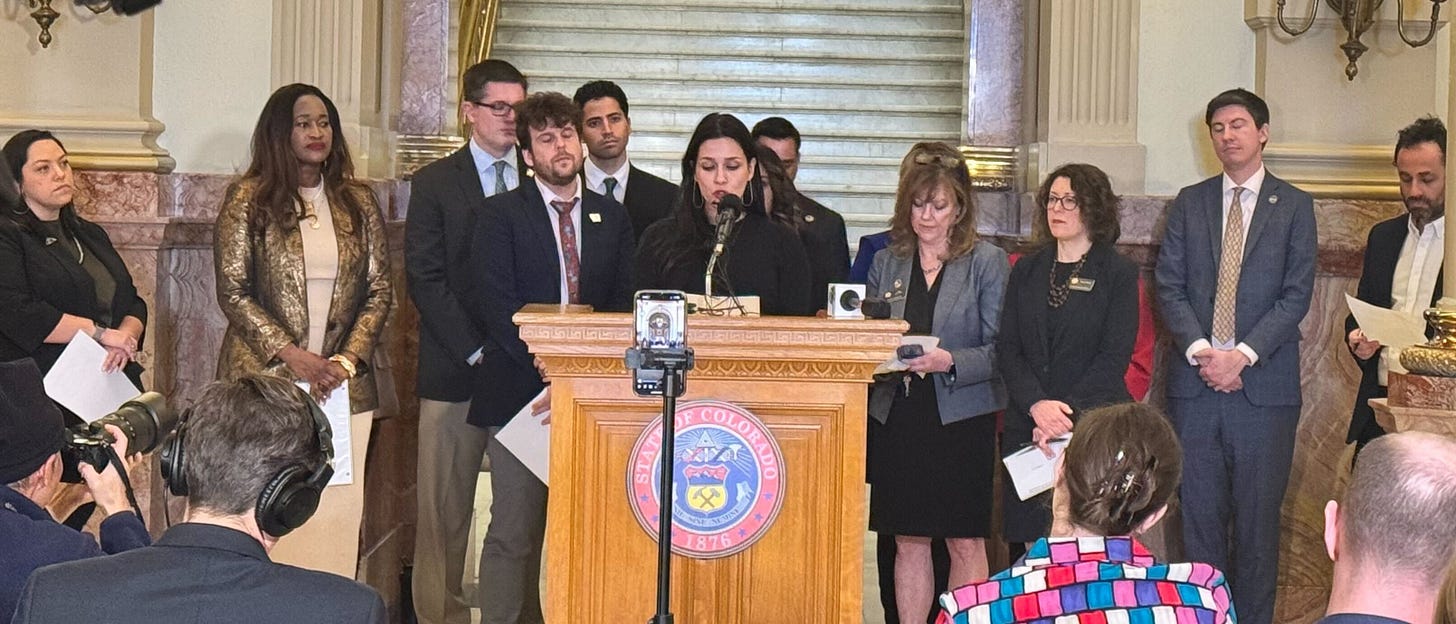Five Years of the Community Economic Defense Project
Recognizing five years of confronting economic abuse and investing in community wealth.
Five years ago, the economy had completely shut down, and nearly half of Americans were out of a job. As eviction defense attorneys, CEDP’s co-founders knew that meant that folks would struggle to pay their rent. Under Colorado law at the time, if people failed to pay their rent within ten days of it being due, they could be legally evicted. In other words, they could be thrown out of their homes at a time when the public health guidance was “safer at home.”
The Community Economic Defense Project emerged from a social media post to respond to this moment. In the middle of the night, Zach Neumann was worried about what was going to happen when rent was due the next day. He put a post on social media offering to help folks who needed support and woke up to hundreds of messages. The next day, he called Sam Gilman, and they got to work on a volunteer effort that would become the COVID-19 Eviction Defense Project.
What began in March 2020 as an all-volunteer community organizing project has evolved into one of the largest anti-poverty organizations and law-firms in Colorado. While our services have broadened, the team has grown, and our name has changed, our purpose remains the same: to partner with low-income and working people to build economic and racial equity. As we celebrate the milestone of our fifth birthday, we remain committed to challenging and dismantling unjust systems and building quickly toward a world where all people have what they need to live and thrive.
At each step in our journey, our clients have guided our development. We began processing emergency rental assistance because our clients were getting evicted despite having been approved for rental assistance because the checks did not arrive on time. We started a call center because Coloradans couldn’t get basic answers about rental assistance or legal aid processes. We took on the state’s tow truck empire because our clients were facing the impossible choice between retrieving their illegally towed cars or paying rent. We started managing housing vouchers and providing homelessness response services because we saw that our neighbors and partners needed capacity.
In five short years, CEDP has evolved to be a state-wide organization with the ability to provide personalized services to thousands of clients across the state. We now have offices in Denver, Colorado Springs, Durango, and Fort Morgan. From all across the state, we are proud of what our team has done in partnership with and in service to our neighbors:
Our team–which has grown to nearly 200 people–has served more than 62,000 people–more than 70% of whom identify as BIPOC or latine–with rental assistance, legal services, benefit enrollment, and homelessness response services.
Our combined rental assistance and legal aid model, which has become a nationally recognized model, has dramatically increased the numbers of Coloradans who get support and helped reduce evictions.
We have delivered more than $200M to clients facing eviction and foreclosure.
Our service footprint has included 59 of the 64 counties in Colorado and New Mexico.
Our research served as a key basis for the United States 2020 eviction moratorium and for the $46 billion in federal investment in emergency rental assistance
We have also elevated our clients' concerns to the policymaking table, passing more than a dozen state tenant and consumer protection laws.
As we turn five, we are so proud of the work we’ve done. For those who want to read a more in-depth history, we’ve included some of the highlights below. At the same time, we know that things keep getting more challenging. Eviction rates are at an all-time high. Affordable housing is out of reach for most low-income Coloradans as the state ranks eighth in the nation in unaffordability. State and federal spending on social services programs are projected to decline, so the system will have fewer resources to tackle the challenges ahead. Rent seeking landlords, towing companies, and private equity firms continue to find new ways to strip wealth from our clients. Over the next five years, we’ll continue to try to make progress in these fights by serving our clients and advocating alongside working people at the legislature.
In closing, we wanted to say thank you. We’re so grateful to you–our partners and clients who believed in us and trusted us over this five-year period (many shoutouts below to people who helped us grow). You’ve trusted us to provide legal services and financial assistance. You’ve trusted us with your stories and as advocates alongside you at the Capitol. You’ve trusted us with your money to build a better world. Thank you for the trust, and we hope to continue to serve our community and make you proud over the next five years and beyond.
Please read along below for some of our top memories from the past five years.
2020
We started on March 30, 2020 with a Facebook post
We started in the earliest days of the pandemic. The COVID-19 Eviction Defense Project, as CEDP was originally called, became a reality when our co-founder Zach Neumann posted a simple Facebook message late at night a day before rent was due, offering to provide legal services free of charge to anyone who needed them.
We formed as a volunteer legal-aid and organizing project
That message generated an overwhelming response. Neumann woke up to several hundred messages asking for support. He called his friend and co-founder Sam Gilman, and they started organizing. They created a Gmail account to organize volunteer lawyers covid19evictiondefenseproject@gmail.com and also began preparing to be helpful in the special legislative session. Remember that time: the public health guidance was “safer at home.” But as eviction defense attorneys, Gilman and Neumann knew that tens of thousands of people were legally at risk of being kicked out of their homes. Early in the project, Carey DeGenaro, Burt Nadler, Javier Mabrey, and Marco Dorado made tremendous efforts to build CEDP’s legal and policy efforts, supporting CEDP with their vision and volunteer labor.
We published national research to highlight the need for greater eviction protections that led to national policy change
As the COVID-19 pandemic continued to wreak havoc on the lives of our neighbors, we advocated for an eviction moratorium to keep people in their homes when the public health guidance was safer at home. Mass evictions were a real threat during the height of the pandemic. Our initial research showed that 19-23 million Americans were at risk of eviction and that evictions were poised to hit Black and Latino communities the hardest. In late summer, we refined our models in partnership with the National Low Income Housing Coalition, EvictionLab, Harvard Joint Center, and MIT and estimated that 30-40 million Americans could be at risk of eviction by the end of 2024. Our advocacy helped to not only extend eviction moratoriums in Colorado and beyond but to develop our emergency rental assistance and eviction diversion program which has been cited by the White House, HUD, and news media as a national best practice model.
Our clients taught us that Colorado needed to build a new financial assistance model
During the summer, some of our clients experienced an eviction. Several weeks later, the rental assistance check arrived. The help was there; it just arrived too late, and they had to tear up the assistance check. There are lots of hard problems out there, but getting a check to people on time is not one of them. CEDP saw a need and raced to meet that need, quickly developing a model that gave renters facing eviction a single point of contact for stability services and that could ensure on-time, even same-day financial assistance payments to avert an eviction.
2021
We hired our team and launched our integrated legal-aid and financial assistance model
On January 1, 2021, CEDP hired its first paid staff, with volunteers Carey DeGenaro, Javier Mabrey, and Burt Nadler joining Neumann and Gilman in working for CEDP full time. Over the course of the year, the team scaled from five to more than 60 employees, distributed more than $16 million in financial assistance, and served more than 4,600 Coloradans.
We passed our first piece of legislation, one of the most impactful tenants' rights bills in years
Alongside sponsors Senators Julie Gonzales and Dominick Moreno and Representatives Yadira Caraveo and Serena Gonzales-Gutierrez, we passed SB21-173. This bill permanently strengthened legal protections for Colorado renters by capping late fees, increasing the cure period for renters who were behind on rent, and requiring the courts to accept rental payments from landlords. These changes have kept thousands of Coloradans in their homes and saved millions of dollars from renters struggling to make ends meet.
We continued to advocate for national renter protections
Our team of legal experts filed an amicus brief for Terkel v. CDC, highlighting that mass evictions during the pandemic have profound economic ramifications that substantially affect interstate commerce, advocating in favor of the continued eviction moratorium that was keeping families from being turned out onto the streets. We published a financial analysis of Emergency Rental Assistance that was used across the country to make the financial case for a moral imperative: homelessness prevention is far more cost-effective than the human and financial costs of homelessness.
2022
As the pandemic recovery entered full swing, we continued to see the need for systemic change and even more connected housing stability services.
We passed a number of consumer protection and tenants' rights bills geared towards protecting our clients’ wealth
After hearing from our clients about the predatory practices of towing companies throughout Colorado, we worked with partners and state legislators to pass HB22-1314, also known as the Towing Bill of Rights. We also helped pass HB22-1287, Protections for Mobile Home Park Residents, in response to a growing need for more regulation in Colorado’s mobile home parks.
We scaled our emergency assistance programs, becoming one of the largest homelessness prevention organizations in the state
While CEDP fought alongside our clients at the state legislature, we continued to increase our ability to help renters facing eviction and displacement. We expanded our efforts to integrate intake and navigation, rapid rental aid payments, eviction legal defense, and, when necessary, rehousing support. We served nearly 20,000 Coloradans in 2022 and disbursed over $72 million in financial assistance to help keep families in their homes. As the demand for services grew, our team grew in response. We also launched new services to meet more of our clients’ needs. We launched a homelessness diversion program, an appellate law program, a community lawyering program, and a contact center for renters facing eviction and displacement. The contact center known as the CARE Center (303-838-1200) replaced an out-of-state call center and, to this day, serves as the primary point of contact for Coloradans in need of rental assistance.
We also changed our name to reflect the ongoing need for our work, evolving from a volunteer pandemic-response organization to the Community Economic Defense Project
At the end of 2022, and with this expansion of our services in mind, we changed our name, shifting from the COVID-19 Eviction Defense Project to the Community Economic Defense Project. Under this new name, we reaffirmed our commitment to our neighbors and our community while recognizing the deep and persistent connection between housing affordability, debt, and poverty that requires integrated solutions.
2023
Under the new mantle of the Community Economic Defense Project, we entered 2023 with a broader mandate. On top of our mission to keep Coloradans housed, we endeavored to build additional stability services and to confront economic abuse in other forms.
We expanded and diversified the services we offer clients
Under the leadership of Chief Programs Officer Christina Garcia and Chief Legal Services Officer Rebecca Cohn, CEDP dramatically expanded its service offerings while continuing to provide a single home for renters facing eviction. We launched a parallel model for homeowners facing foreclosure that included emergency mortgage assistance and legal defense. We built digital equity and disaster response teams. We began to manage housing vouchers across the state. And we launched Homelessness Response programs that included case management, housing assistance, and housing navigation.
CEDP responded to unprecedented eviction rates by successfully advocating for more support
2023 also saw an unprecedented number of evictions in Denver and across Colorado. As we saw the accelerating flood of eviction filings, we partnered with our community to advocate for increased rental assistance funding. This advocacy alongside Denver City Councilmembers and state legislators led to nearly $30 million in additional rental assistance being added to the 2024 Denver budget and $30 million in additional funding for the state budget.
At the legislature, we fought to bring down the costs of prescription drugs
Through HB23-1002, we fought to cap the costs of EpiPens and strengthen protections for insulin users. This bill reduced the cost of life-saving medication by 90%.

We hosted a statewide conversation about poverty in America with Matthew Desmond
We were also honored to host Pulitzer Prize-winning author and head of Princeton’s Eviction Lab, Matthew Desmond, in Denver for a conversation about poverty in America. It was an incredible way to engage with the Denver community and learn more about what drives poverty in our communities and how we can help combat it.
Our Appellate Law program won a case at the Colorado Supreme Court with national implications
In June 2023, our Appellate Law program at CED Law, brought a successful appeal to the Colorado Supreme Court. The ruling in Arvada Village Gardens v. Ana Garate enforced that landlords in CARES Act-covered properties must issue at least a 30-day notice before filing an eviction in court. This decision helped give struggling families in Colorado the time they needed to get back on their feet and avoid displacement. It also set precedent that helped guide interpretations of the CARES Act all across the United States.
2024
In 2024, CEDP expanded and diversified its work across Colorado, growing into new service areas and investing in systemic change in the courts and at the legislature.
We expanded and diversified CEDP’s work across the state of Colorado
In 2024, CEDP saw a multitude of changes and rapid growth as we deepened our work across the state. We opened an office in Durango and Fort Morgan, and we got new office space in Colorado Springs and Northeast Colorado. Throughout the year and across 17 different legal, financial, and stability programs, we provided over $77 million in financial assistance and support to over 30,000 people across Colorado. We launched eight new programs to better serve our clients, including our housing counseling team which is now approved and certified through HUD, and major new initiatives to serve people across the state experiencing homelessness. Our model couples financial assistance with case management, peer support counseling, and benefit enrollment services, among others.
In the midst of this expansion, CEDP led campaigns and coalitions that passed 8 housing and consumer protection bills during the 2024 Colorado Legislative Session
The legislation we worked on this year was in direct response to the stories we heard from our clients and addressed predatory practices that were exacerbating financial and housing instability. Some of the bills we helped to pass in 2024 included HB24-1098, our For Cause Eviction bill; SB24-094, our Warranty of Habitability bill; HB24-1337, which places strong guardrails around HOA foreclosures; HB24-1267, which prohibits Metro District foreclosures for unpaid assessments, and HB24-1051, which regulates Colorado’s towing industry and keeps predatory towing companies in check.
Our Appellate Program won big appeals that changed Colorado Law
Our Appellate Program at CED Law continued to fight for clients in the Colorado Courts in 2024 and saw many big wins. This included the Colorado Supreme Court’s ruling in Miller v. Amos that a violation of the Colorado Fair Housing Act can be used as an affirmative defense to eviction; the Court of Appeals’s ruling in VOA Sunset Hous. LP v. D’Angelo that Colorado’s anti-SLAPP statute, which protects First Amendment free speech rights, applies to defendants in eviction cases; and the Denver District Court’s ruling in VOA Sunset Hous. LP v. D’Angelo, which clarified the notice and due process that must be afforded to a project-based Section 8 tenant in an eviction proceeding.
Hosted consumer protection forum with our clients and FTC Chair Lina Khan and Attorney General Phil Weiser
In response to the concerns we heard expressed by our clients and our partners, CEDP also hosted FTC Chairwoman Lina Khan and Colorado Attorney General Phil Weiser at our Denver office to discuss the profound challenges renters face in Colorado. Some of the issues facing tenants in the state include affordable housing, exorbitant late fees and fines, security deposit theft, algorithmic price-fixing, and corporate investors buying up mobile home parks and rental properties. We were honored to have the opportunity to share these concerns with the Chairwoman and Attorney General and advocate for change in our state and across the country.
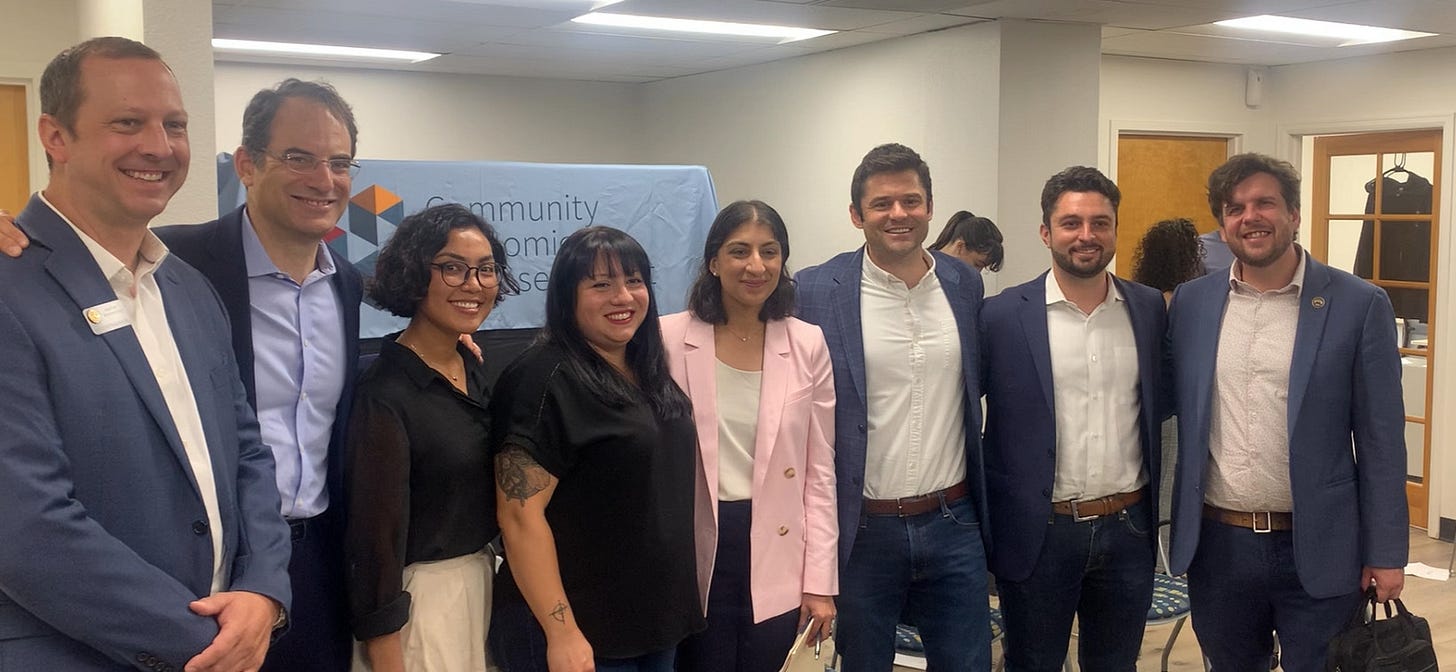
We were awarded federal funds to launch mobile eviction defense clinics
Thanks to Senator Bennet and Rep. Jason Crow, we also received $840,000 in federal funding for our Just Bus mobile office, which will officially launch in 2025. The Just Bus will provide legal aid and financial assistance to families across Colorado. We’re excited to launch this resource and make it available to Coloradans across the state who do not have easy access to legal and stability services.
2025
Looking ahead, and an enormous thank you!
As we look ahead, we see deepening affordability challenges, the potential for further economic turmoil, and an ever greater need for consumer and renter protections in an economy that increasingly favors capital at the expense of working people. We promise to stay in the work alongside each of you. We’re steadfast in our dedication to the fight for economic justice and racial equity. While the needs of our communities here in Colorado continue to evolve, we’ll continue the work to keep Coloradans in their homes, provide support to those in need of assistance, and confront economic abuse when we see it in our community.
In closing, we want to say some enormous thank-yous to our partners and neighbors who have trusted us to serve them and stand alongside them in fights for economic justice and racial equity. We have partnered with so many groups across the state and country. Each of these partnerships deepens our work and helps us collectively advance our mission and serve our community. Normally, we would seek to name and acknowledge everybody. Understanding the changing nature of the work that we do, we want to extend our deepest gratitude to each of you. We’re so grateful to our public sector partners, our funders, and our community partners–we couldn’t do this work without you.











